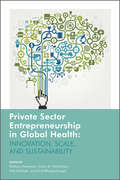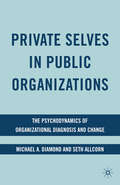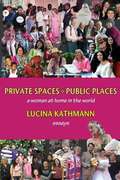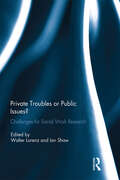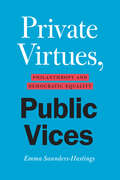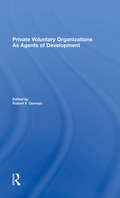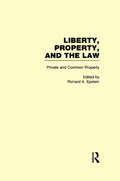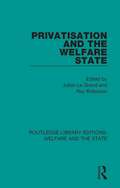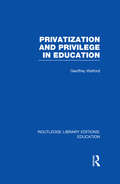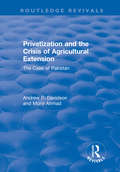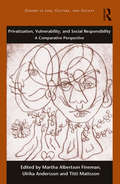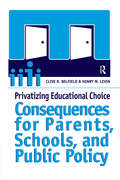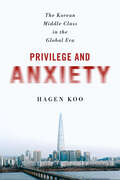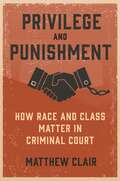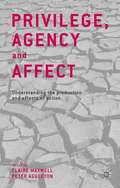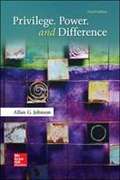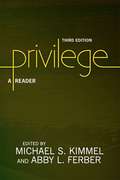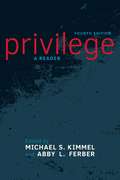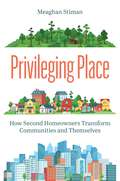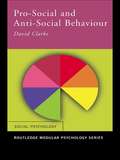- Table View
- List View
Private Sector Entrepreneurship in Global Health: Innovation, Scale and Sustainability
by Will Mitchell Kathryn Mossman Anita M. McGahan Onil BhattacharyyaPoor access to care in low- and middle-income countries due to high costs, geographic barriers, and a shortage of trained medical staff has motivated many organizations to rethink their model of health service delivery. Many of these new models are being developed by private sector actors, including non-profits, such as non-governmental organizations, and for-profits, such as social enterprises. By partnering extensively with public sector organizations, these non-state actors have enormous potential to scale innovation in global health. Understanding how these leading organizations operate and target hard-to-reach groups may yield key insights to sustainably improve health care for all. Private Sector Entrepreneurship in Global Health includes writings by management, medicine, and social science experts who have studied trends in private sector health care innovations over the last ten years. It provides a wide range of examples from many regions and health areas and outlines tools to assess the performance of innovative private sector health programs in low- and middle-income countries. The studies reported in this volume explore new marketing and finance models, digital health innovations, and unique organizational processes emerging from the private sector to serve those most in need. Drawing on the analysis of over one thousand organizations engaged in health market innovations, this volume is a valuable resource for researchers and students in management, global health, medicine, development studies, health economics, and anthropology, as well as program managers, social impact investors, funders, and policymakers interested in understanding approaches emerging from the private sector in health care.
Private Selves in Public Organizations
by Michael A. Diamond Seth AllcornThis book explores organizations as not simply rational, technological structures and networks for organizing people around tasks and services; it defines organizations as relational, experiential, and perceptual systems.
Private Spaces, Public Places: A Woman at Home in the World
by Lucina KathmannA collection of 20 plus essays finding the author, Lucina Kathmann in widely varied roles and spaces; mothering six adopted orphans in her home in the center of Mexico; tutoring middle school math students in Chicago, creating a story about a backward jumping kangaroo to explain the number line; sampling sheep's brains as the honored guest of the Kurdish PEN chapter, traveling the world as a Vice- President of PEN International, always encouraging women writers working at great odds to make their voices heard. Serious and droll by turns, her stories reveal a world seldom open to outsiders from the West.
Private Troubles or Public Issues?: Challenges for Social Work Research
by Ian Shaw Walter LorenzThis book bears testimony to the value of a progressive form of academisation of social work education in most European countries, including former communist countries which had to re-establish social work education. It also manifests the confidence of contributors in belonging to a serious academic discipline, and the fruitfulness of bringing research ‘home’ from neighbouring disciplines such as sociology, psychology, social policy, or pedagogy into the mainstream of social work. The contributions to this book converge on a small number of core issues for contemporary social work. These are methodologically the conceptualisation of different and interacting dimensions of diversity, and practically the defence of professionalism and discretion against encroachment by neo-liberal ideologies and cost-cutting regulations. In so doing, this underscores that theory matters in social work. Authentic social work research can demonstrate that social work practice has no reason to shy away from basing itself on evidence and being professionally accountable as long as its notion of evidence recognises and does justice to the complexity of social problems and acknowledges the value of inter-subjectivity in producing useable and ethically grounded evidence. This book was originally published as a special issue of the European Journal of Social Work.
Private Virtues, Public Vices: Philanthropy and Democratic Equality
by Emma Saunders-HastingsA thought-provoking challenge to our ideas about philanthropy, marking it as a deeply political activity that allows the wealthy to dictate more than we think. Philanthropy plays a huge role in supporting the provision of many public goods in contemporary societies. As a result, decisions that affect public outcomes and people’s diverse interests are often dependent on the preferences and judgments of the rich. Political theorist Emma Saunders-Hastings argues that philanthropy is a deeply political activity. She asks readers to look at how the power wielded by philanthropy impacts democracy and deepens political inequality by enabling the wealthy to exercise outsize influence in public life and by putting in place paternalistic relationships between donors and their intended beneficiaries. If philanthropy is to be made compatible with a democratic society of equals, it must be judged not simply on the benefits it brings but on its wider political consequences. Timely and thought-provoking, Private Virtues, Public Vices will challenge readers’ thoughts on what philanthropy is and how it truly affects us.
Private Voluntary Organizations As Agents Of Development
by Robert F. GormanPrivate voluntary organizations have an increasingly important role to play in the provision of development assistance, either as alternative forms of resource flow or as channels of aid that are systematically integrated into the official intergovernmental aid system. This book explores the practical and theoretical aspects of PVOs, including the
Private and Common Property: Liberty, Property, and the Law
by Richard A. EpsteinFirst published in 2000. Routledge is an imprint of Taylor and Francis, an informa company.
Privatisation and the Welfare State (Routledge Library Editions: Welfare and the State #12)
by Julian Le Grand Ray RobinsonOriginally published in 1984, Privatisation and the Welfare State brings together a distinguished set of experts on the Welfare State and its main policy areas of health care, housing, education and transport. Each chapter provides some much-needed analysis of privatisation policies in areas where, too often, political rhetoric is allowed to dominate discussion. The book makes a major contribution to the reader’s understanding of the complex issues involved in this controversial area of social policy. As the first systematic evaluation of a broad range of welfare state privatisation proposals, it is essential reading for economists, social administrators, and political scientists.
Privatization and Privilege in Education (Routledge Library Editions: Education)
by Geoffrey WalfordCan privilege be bought? Arguments have raged over whether private education in the UK is ‘the cement in the wall’ dividing British society, or whether parental choice is, as has also been argued ‘a key component of a free society’. The author here describes the traditional private sector schools, paying attention to the ways in which parents can purchase privilege for their children through attendance at such schools. He argues that the privatized system is kept under tight control if a growth in social and educational inequality and a deepening of social class and ethnic group division is to be avoided. The book is unique in combining an account of private schools in Britain with an examination of the process of privatization.
Privatization and the Crisis of Agricultural Extension: The Case of Pakistan (King's Soas Studies In Development Geography)
by Andrew Davidson Ahmed MunirThis title was first published in 2003. he public sector plays a dominant international role in the provision of agricultural extension and services. This role has been the subject of much debate. Some argue for extension's privatization, claiming that a market driven system provides the most rational and efficient means of information delivery. Based on extensive empirical research from the Punjab (Pakistan), this volume examines the comparative effectiveness of public and private extension services from the perspective of farmers. It also focuses on information from extension agents about their respective organizations and work environments. In so doing, the book expands and elaborates on the practical considerations of privatization and information delivery. It then broadens out into a discussion of alternative means of extension delivery, focusing on participatory approaches, education theory and pluralism.
Privatization, Vulnerability, and Social Responsibility: A Comparative Perspective (Gender in Law, Culture, and Society)
by Martha Albertson Fineman Ulrika Andersson Titti MattssonTaking a cross-cultural perspective, this book explores how privatization and globalization impact contemporary feminist and social justice approaches to public responsibility. Feminist legal theorists have long problematized divisions between the private and the political, an issue with growing importance in a time when the welfare state is under threat in many parts of the world and private markets and corporations transcend national boundaries. <p><P> Because vulnerability analysis emphasizes our interdependency within social institutions and the need for public responsibility for our shared vulnerability, it can highlight how neoliberal policies commodify human necessities, channeling unprofitable social relationships, such as caretaking, away from public responsibility and into the individual private family. This book uses comparative analyses to examine how these dynamics manifest across different legal cultures. By highlighting similarities and differences in legal responses to vulnerability, this book provides important insights and arguments against the privatization of social need and for a more responsive state.
Privatizing Educational Choice: Consequences for Parents, Schools, and Public Policy
by Henry M. Levin Clive R BelfieldControversies over the merits of public and private education have never been more prominent than today. This book evaluates public and private schooling, especially in regard to choices families must make for their children.While choice among publics schools is widely advocated today by families and states, public support for private education - including vouchers, tax credits, charter schools, and private contracting - is politically controversial. The authors accessibly describe what research shows as to the effects - for communities and children - of these approaches. They move beyond school choice to show how other factors - most notably the family - have a strong effect on a child's educational success. The book helps educators and parents better understand the rapidly changing educational environment and the important choices they make in educating the nation's children.
Privatizing Poland: Baby Food, Big Business and the Remaking of Labor
by Elizabeth C. DunnThis book examines the effects privatization has on workers' self-concepts; how changes in "person-hood" relate to economic and political transitions; and how globalization and foreign capital investment affect Eastern Europe's integration into the world economy.
Privatizing Poland: Baby Food, Big Business, and the Remaking of Labor
by Elizabeth C. DunnThe transition from socialism in Eastern Europe is not an isolated event, but part of a larger shift in world capitalism: the transition from Fordism to flexible (or neoliberal) capitalism. Using a blend of ethnography and economic geography, Elizabeth C. Dunn shows how management technologies like niche marketing, accounting, audit, and standardization make up flexible capitalism's unique form of labor discipline. This new form of management constitutes some workers as self-auditing, self-regulating actors who are disembedded from a social context while defining others as too entwined in social relations and unable to self-manage. Privatizing Poland examines the effects privatization has on workers' self-concepts; how changes in "personhood" relate to economic and political transitions; and how globalization and foreign capital investment affect Eastern Europe's integration into the world economy. Dunn investigates these topics through a study of workers and changing management techniques at the Alima-Gerber factory in Rzeszów, Poland, formerly a state-owned enterprise, which was privatized by the Gerber Products Company of Fremont, Michigan. Alima-Gerber instituted rigid quality control, job evaluation, and training methods, and developed sophisticated distribution techniques. The core principle underlying these goals and strategies, the author finds, is the belief that in order to produce goods for a capitalist market, workers for a capitalist enterprise must also be produced. Working side-by-side with Alima-Gerber employees, Dunn saw firsthand how the new techniques attempted to change not only the organization of production, but also the workers' identities. Her seamless, engaging narrative shows how the employees resisted, redefined, and negotiated work processes for themselves.
Privilege and Anxiety: The Korean Middle Class in the Global Era
by Hagen KooIn Privilege and Anxiety, Hagen Koo examines what has happened to the Korean middle class in the era of neoliberal globalization and demonstrates that global economic change brought more profound changes than mere economic decline and shrinking size to this class.Globalization has inserted an axis of polarization into the middle class, separating a small minority that benefits from the globalized economy from the large majority that suffers from it. This internal differentiation generates a challenging dynamic within Korean society, as the newly affluent seek to distinguish themselves from the rest of the middle class to establish a new, privileged class position. Privilege and Anxiety explores how these tensions play out in three areas: consumption and lifestyle, residential differentiation, and education. In all three areas, the dominant orientation of the affluent middle class is to preserve their newfound privilege and to pass it onto their children. Their new class practices, Koo argues, bring great anxiety to both the winners and losers of neoliberal globalization.
Privilege and Punishment: How Race and Class Matter in Criminal Court
by Matthew ClairHow the attorney-client relationship favors the privileged in criminal court—and denies justice to the poor and to working-class people of colorThe number of Americans arrested, brought to court, and incarcerated has skyrocketed in recent decades. Criminal defendants come from all races and economic walks of life, but they experience punishment in vastly different ways. Privilege and Punishment examines how racial and class inequalities are embedded in the attorney-client relationship, providing a devastating portrait of inequality and injustice within and beyond the criminal courts.Matthew Clair conducted extensive fieldwork in the Boston court system, attending criminal hearings and interviewing defendants, lawyers, judges, police officers, and probation officers. In this eye-opening book, he uncovers how privilege and inequality play out in criminal court interactions. When disadvantaged defendants try to learn their legal rights and advocate for themselves, lawyers and judges often silence, coerce, and punish them. Privileged defendants, who are more likely to trust their defense attorneys, delegate authority to their lawyers, defer to judges, and are rewarded for their compliance. Clair shows how attempts to exercise legal rights often backfire on the poor and on working-class people of color, and how effective legal representation alone is no guarantee of justice.Superbly written and powerfully argued, Privilege and Punishment draws needed attention to the injustices that are perpetuated by the attorney-client relationship in today’s criminal courts, and describes the reforms needed to correct them.
Privilege in the Soviet Union: A Study of Elite Life-Styles under Communism (Routledge Revivals)
by Mervyn MatthewsFirst published in 1978, this unique work throws much-needed light upon the exact nature of privilege and elite life-styles in the contemporary Soviet Union, under the Communist regime. Dr Matthews' study places these life-styles in a historical perspective, and characterises, in sociological terms, the people who enjoyed them. This study is based on an extensive programme of personal interviews among emigré groups and a close analysis of original and little-known legal historical sources. There are special sections on the nature of change in the Soviet elite and on social mobility. This reissue will attract interest amongst students and scholars concerned with the history, politics and sociology of the Soviet Union; it will also be of value to all those concerned with the age-old problem of social equality.
Privilege, Agency and Affect
by Peter Aggleton Claire MaxwellDrawing on a range of theoretical perspectives and engaging with new empirical evidence from around the world, this collection examines how privilege, agency and affect are linked, and where possibilities for social change might lie.
Privilege, Power, and Difference
by Allan G. JohnsonThis brief book is a groundbreaking tool for students and non-students alike to examine systems of privilege and difference in our society.
Privilege, Power, and Difference
by Allan G. JohnsonPrivilege, Power, and Difference is a groundbreaking tool for students and non-students alike to examine systems of privilege and difference in our society. Written in an accessible, conversational style, the 3rd edition links theory with engaging examples in ways that enable readers to see the underlying nature and consequences of privilege and their connection to it. This program has been used across the country, both inside and outside the classroom, to shed light on issues of power and privilege. The Connect course for this offering includes SmartBook, an adaptive reading and study experience which guides students to master, recall, and apply key concepts while providing automatically-graded assessments.
Privilege: A Reader
by Michael S. Kimmel Abby L. FerberPrivilege is about more than being white, wealthy, and male--as Michael Kimmel, Abby Ferber, and a wide range of contributors make clear in this innovative and timely anthology. In an era when "diversity" is too often shorthand for "of color" and/or "female," the personal and analytical essays in this collection explore the multifaceted nature of social location and consider how gender, class, race, sexual orientation, (dis)ability and religion interactto create nuanced layers of privilege and oppression. The individual essays are powerfully thought-provoking; taken together, they help guide students to a deep understanding of the dynamics of diversity and stratification, advantage and power. The third edition features ten new or newly-recast essays which will help students understand the intersectional nature of privilege and oppression. Enhanced pedagogy (including new discussion questions and "personal connections" activities at the conclusion of each section) encourages students to examine their own assumptions, beliefs, values, practices, and social locations--without becoming overwhelmed.
Privilege: A Reader
by Michael S. Kimmel Abby L. FerberPrivilege is about more than being white, wealthy, and male-as Michael Kimmel, Abby Ferber, and a range of contributors make clear in this timely anthology. In an era when "diversity” is too often shorthand for "of color” and/or "female,” the personal and analytical essays in this collection explore the multifaceted nature of social location and consider how gender, class, race, sexual orientation, (dis)ability, and religion interact to create nuanced layers of privilege and oppression. The individual essays-taken together-guide students to a deep understanding of the dynamics of diversity and stratification, advantage, and power.The fourth edition features thirteen new essays that help students understand the intersectional nature of privilege and oppression and has new introductory essays to contextualize the readings. These enhancements, plus the updated pedagogical features of discussion questions and activities at the end of each section, encourage students to examine their own beliefs, practices, and social location.
Privileging Place: How Second Homeowners Transform Communities and Themselves
by Meaghan StimanHow second homeowners strategically leverage their privilege across multiple spacesIn recent decades, Americans have purchased second homes at unprecedented rates. In Privileging Place, Meaghan Stiman examines the experiences of predominantly upper-middle-class suburbanites who bought second homes in the city or the country. Drawing on interviews with more than sixty owners of second homes and ethnographic data collected over the course of two years in Rangeley, Maine, and Boston, Massachusetts, Stiman uncovers the motivations of these homeowners and analyzes the local consequences of their actions. By doing so, she traces the contours of privilege across communities in the twenty-first century.Stiman argues that, for the upper-middle-class residents of suburbia who bought urban or rural second homes, the purchase functioned as a way to balance a desire for access to material resources in suburban communities with a longing for a more meaningful connection to place in the city or the country. The tension between these two contradictory aims explains why homeowners bought second homes, how they engaged with the communities around them, and why they ultimately remained in their suburban hometowns. The second home is a place-identity project—a way to gain a sense of place identity they don&’t find in their hometowns while still holding on to hometown resources. Stiman&’s account offers a cautionary tale of the layers of privilege within and across geographies in the twenty-first century.
Pro Freeware and Open Source Solutions for Business: Money-Saving Options for Small Enterprises
by Phillip WhittThis book will point the way to numerous free, low-cost, and open-source software solutions that could provide viable alternatives to their paid counterparts. Pro Freeware and Open Source Solutions for Business is now in its Second Edition; it has been thoroughly revised and updated. This book covers the most up-to-date software versions. Software described in the First Edition that is no longer available has been replaced with comparable titles when possible. The book starts with an office productivity tool known as OfficeLibre and goes on to explain CRM and compression software. You will then learn about desktop publishing, illustration, 3D modeling, and photo editing software. As we progress further, you will learn more about audio-video capture and editing software along with Openshot, an easy-to-use free video editor. You will also learn about available project planning and time tracking software, and much more. By the end of the book, you will have also gained knowledge about security programs, as well as how to use Linux on Windows and MacOS. With the challenging economic times we find ourselves in, this book may be more important than ever to help small business owners eliminate and reduce costs, and keep more money in their business. . What You Will Learn Understand the important differences between freeware and open-source software.Discern which paid commercial software the free version replaces (when applicable).Gain insight into how organizations and municipalities around the world adopting open-source software to save money on licensing fees. Who This Book Is For Primarily small business owners, solo entrepreneurs or freelancers on a budget, and cost efficiency experts.
Pro-Social and Anti-Social Behaviour (Routledge Modular Psychology)
by David ClarkePro-Social and Anti-Social Behaviour describes the nature and causes of pro-social and anti-social behaviour. It is an introductory level text aimed at students new to this area of Social Psychology. Topics covered include social psychological theories of aggression, altruism and bystander behaviour, and media influences on pro- and anti-social behaviour. Each section includes information on research carried out in these areas of study.
